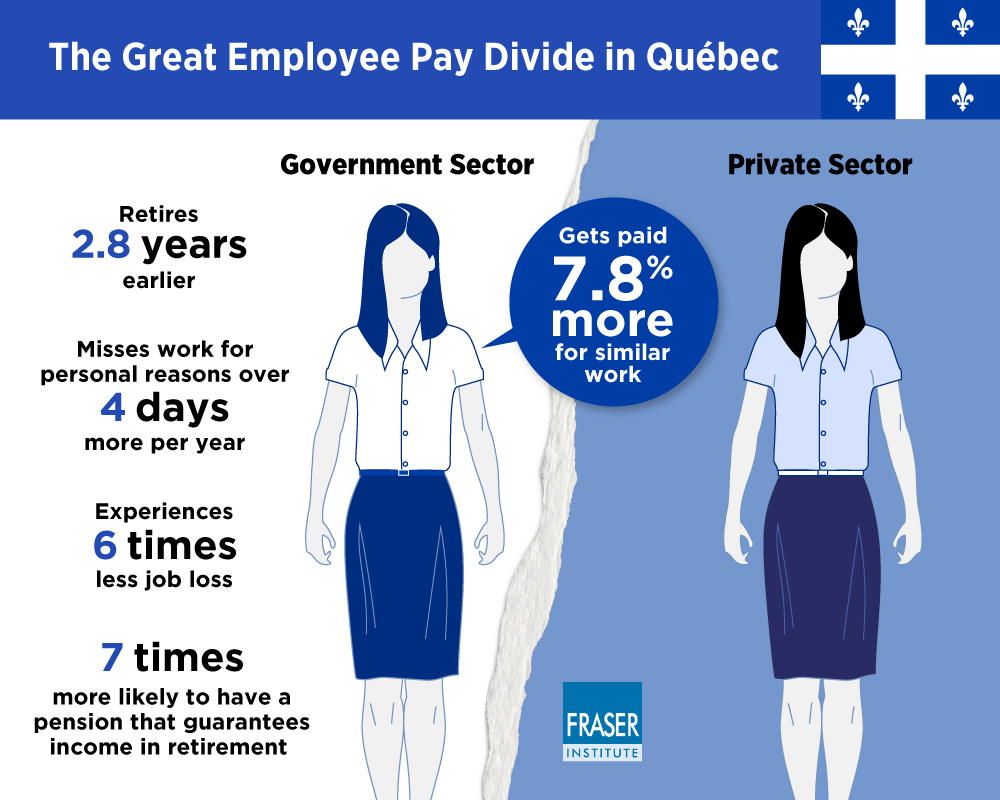Government workers in Quebec enjoy pay premium over private-sector counterparts

Over the past decade, Quebec has made significant progress in improving its government finances. While Ontario and Alberta, for example, saw their debt burdens rise relative to the size of their economies, the opposite has occurred in Quebec. In 2012/13, the provincial government’s debt load was just over half as large as the provincial economy. This year, that figure will be 35.9 per cent.
Despite this improvement, Quebec still faces real fiscal challenges. The province has slipped back into annual operating deficits in some recent years, and the debt burden remains substantial. The provincial government holds approximately $23,000 in net debt per resident.
If the Legault government wants to put Quebec on sounder fiscal footing and prevent further debt growth, it should restrain the growth of the public-sector wage and compensation bill.
Of course, it’s important for public-sector organizations to offer competitive compensation to attract qualified employees. It’s also important, however, to safeguard taxpayer dollars by being careful not to pay above market rates. A recent study published by the Fraser Institute shows that in Quebec, governments may be overshooting the mark.
The study compares all public-sector workers in the province—not just those working for the province. Since the provincial government is a major public-sector employer, the Legault government should carefully review its wage bill in light of this evidence with an eye to identifying possible savings.
Using data on individual workers throughout 2021 (the most recent year of comprehensive data), the study compared the wage of private sector and government employees while adjusting for factors including age, education and employment industry so that similar workers were compared to each other. The results showed that government workers enjoy a clear compensation advantage relative to their private-sector peers.
Specifically, the study found that government workers in Quebec enjoy a 7.8 per cent wage premium compared to similar private-sector workers.
Of course, in addition to wages there are other forms of employee compensation. Although it’s not possible using available data to provide a complete accounting and comparison of all non-wage compensation, our study did provide a comparison of several types of non-wage benefits and found that government workers, on average, hold many other advantages. The infographic below illustrates several of these advantages.

Let’s start with pensions. According to available data, 93.5 per cent of government workers are covered by a registered pension compared to 23.7 per cent of private-sector workers. Government workers were also much more likely to have a defined benefit plan that guarantees a retirement income.
Government workers in Quebec also retire, on average, approximately 2.8 years earlier than other workers in the economy. And enjoy more job security—in 2021, the rate of job loss in the private sector was much higher than it was for government workers.
Less commonly discussed dimensions of employment also come into play when comparing the two sectors. Full-time government-sector workers took more time off for personal reasons (16.4 days on average) than their private-sector counterparts (12.0 days).
Prudent public management requires careful attention to all major areas of public expenditure. The government wage and compensation bill is no exception. The best available evidence suggests government-sector workers are (on average) receive higher pay and greater benefits than their private-sector peers, a reality that continues to put pressure on government budgets including the provincial government in Quebec.
Author:
Subscribe to the Fraser Institute
Get the latest news from the Fraser Institute on the latest research studies, news and events.

